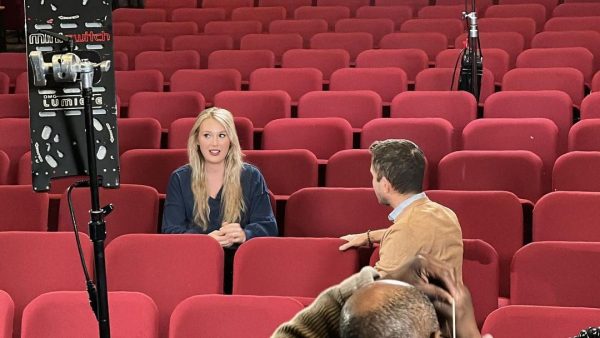Are we ready for another war in the Middle East?
The Deployment Disagreement:
In light of the Paris attacks, which have been called by many the second deadliest terrorist attack against a Democratic city since 9/11, discussions and debates about the “ISIS question” have been enflamed. In the wake of the attack, many American politicians and officials are taking more hardline stances against the Islamic State. NPR reports that Republican presidential hopeful Chris Christie is basing his entire campaign on the fight against ISIS and other terrorist groups.
NPR reports that France has begun a renewed air campaign against the Islamic State, contributing to the multinational military operation, “Inherent Resolve,” which, according to U.S. Department of Defense, has flown over 50,000 combat missions against the Islamic State in Iraq and Syria.
Even outside the political and military settings, many are asking what should be done next. The debate over the solution to the “ISIS problem” is a divisive one, both in the international stage, and within Annandale High School.
Between Monday, November 30th, and and Wednesday, December 2nd, 150 students, composed of a mix of sophomores, juniors, and seniors, were asked to complete a seven question survey during their government and TOK classes. The survey questions focused around the viability of military action against ISIS.
A slight majority of students supported military action against the Islamic State. 51% either “slightly agreed,” or “strongly agreed” that the United States should commit to a ground war to fight against the Islamic state. Senior Natnael Mulat is among the supporters of direct military action against the Islamic State.
“In spite of the bad consequences, by sending [troops] to help fight ISIS, we’re helping other people,” Mulat Said. “[The Islamic State’s] actions are a direct attack against Western Culture. I feel like we should have a way to defend ourselves against [the Islamic State].”
While a narrow majority of students are in favor of committing to a large-scale ground war against ISIS, a number of students are opposed to joining the conflict. Senior Zachary Woodward, who plans on enlisting in the Navy after graduation, is one of them.
“Personally I think there is no positive outcome of putting troops in Syria [to] fight ISIS, there is just too much turmoil [in the region],” Woodward said. “It’s basically a guerilla war [in Syria]. There would be way more losses than victories.”
Brains over Brawn:
Though Annandale students are largely in favor of fighting ISIS, a large number of students do not think military action alone is enough to defeat the Islamic State. 58% of the students surveyed either “strongly disagreed,” or “slightly disagreed” that the Islamic State could be defeated through military action alone.
The disconnect between these two questions – whether the United States should commit to a ground war against the Islamic State, and whether the Islamic State can be defeated through military action alone – is an interesting one. While the majority of students (51%) believe that military action is appropriate, an even larger majority of students believe that it is going to take more than military operations to actually defeat ISIS (58%). Senior Lailah Said believes that the public needs more information about ISIS to effectively fight it.
“Even though military action is good, that’s not enough,” Said said. “We need to know exactly what ISIS is. We need to understand what their purpose is… so we know what we are up against.”
Nationally, NPR reports that United States has promised to deploy 50 special operations forces to Syria to help fight against the Islamic State. That said, these special forces will not be fighting on the front lines. CNN reports that American special forces deployed to the region “do not have a combat mission,” but “could seek permission to go into the field” when necessary. Additionally, CNN reports that the United States has deployed A-10 and F-15 fighters in neighboring Turkey to help fight against the Islamic State. The A-10, equipped with a main gun that is the size of a small car, is particularly revered for its role as a ground attack fighter.
Students generally do not think the United States is doing enough to fight the Islamic State. 35% of those surveyed “slightly disagreed” when asked if the U.S. was doing enough to fight the Islamic State, and 33% were “neutral.” Many of the students who gave neutral responses specifically noted that “they did not know enough” to have an opinion, a testament to how well the U.S. is publicizing its attempts to fight the Islamic State.
The primary aspect U.S. strategy against the Islamic State has been the use of Airstrikes. According to the U.S. Department of Defense, airstrikes against the Islamic State have been ongoing since August, 2014 as a part of Operation “Inherent Resolve.”
Passing the Torch:
While only a narrow majority of students believe that the U.S. should conduct a ground war against the Islamic State, a large number of the students surveyed were in favor of supporting groups and countries that wished to take matters into their own hands. 66% of surveyed students either “slightly agreed” or “strongly agreed” that the United States should offer logistical assistance, such as providing weapons, resources, and aircraft carrier support to countries willing to fight the Islamic State. 60% either “slightly agreed,” or “strongly agreed” that the United States should arm, train, and advise independent and paramilitary groups fighting the Islamic State, such as the Kurdish ethnic minority, or Syrian rebels.
NPR reports that the United States has been offering air support and weapons to “moderate opposition groups,” paramilitary groups that have varying sizes and interests. Support to these groups has been contentious in American politics, however. The Telegraph has reported that a U.S. trained division of Syrian rebels “handed over their weapons” to an Al-Qaeda affiliate in Syria shortly after re-entering the country. Despite this defection, NPR reports that the United States has continued to offer air support to various Syrian groups fighting the Islamic State.
The survey indicates that many students are in favor of military action, but only to an extent. A larger majority of students believed that the Islamic State could not be defeated through military action alone. An even larger majority, 66%, were in favor of supporting other groups and nations that wanted to fight the Islamic State.
An increasing number of countries and factions are becoming involved in Syria. Reuters were amongst the first to report the beginning of Russia’s air campaign in Syria, and NPR has reported that France has begun a renewed series of airstrikes in light of the Paris attacks. The United States is no longer the only major power fighting in Syria against the Islamic State. Social studies teacher Tim Kelly, in light of the invasion of Iraq, an event he calls the “2003 debacle,” is cautious about taking up the mantle to fight the Islamic State.
“I would be extremely reluctant to take the kind of direct action [against ISIS] that would involve anything more than what we are currently doing on the ground,” Kelly said. What happens if the United States gained territory from ISIS? How long are we there? What kind of stable political situation can we help create that would prevent the same [power] vacuum being there where more discontent can be fueled?”

Nicholas Mortensen is a senior at Annandale High School and is a first-year staff writer at the A-Blast. Nicholas is an IB Diploma candidate, and is a...







